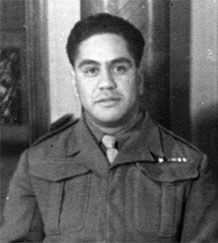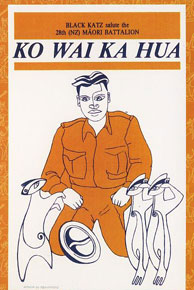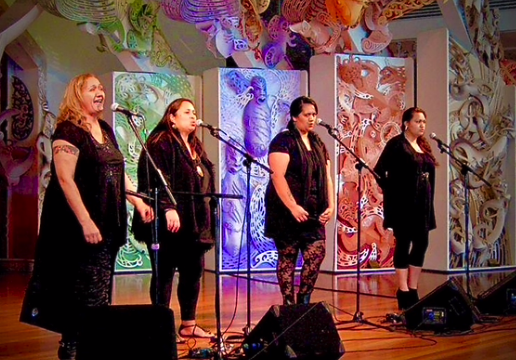|
Maori songs - Kiwi songs - Home This
song is a wonderful example of Aroha Whakamoritanga; an
enduring relationship of equals in the old Maori way. Its
tells of a soldier's longing for his faraway darling, and
its music is 1940s swing style. This had me thinking its
had been composed by Major Huata MC in about 1943.
But he actually wrote these words after his wife passed away in 1981, when all the memories and emotions he had shared with many of his comrades in the 28th Maori Battalion in North Africa and Italy came flooding back to him again. Most popular version Literal translation for learners
(Source: this 2006 booklet: "Black Katz Salute the 28th Maori Battalion" Notes
|
|
Ngātai Huata 1988 |
Toni Huata 2000 | Kui Waho 2019 |
| Ko wai ka hua ka tohu
Aroha pūmau tonu Ahakoa te iti noa Piri kau mai anō |
Ko wai ka hua ka tohu
Te aroha pūmau tonu Ahakoa te iti noa Piri kau mai anō |
Ko wai ka hua ka tohu
Te aroha pūmau tonu Ahakoa te iti noa Piri kau mai anō. |
| Māha noa te wairua Mā ngā waru ana, Kakapa tōmina mai Auē te aroha e ... |
Maha
noa te wairua Manawarū ana Kakapa tōmina mai Aue te aroha e |
Māha noa te wairua Mānga waru ana, Kakapa tōmina mai Auē te aroha e |
| Aroha tonu Tūhirahira mai Whakahiapo āhei anō Hei tirohanga Hei atawhai |
Aroha tonu Tūhirahira mai Whakahiapo āhei anō Hei tirohanga Hei atawhai |
Aroha tonu Tūhirahira mai Whakahiapo āhei anō Hei tirohanga... Hei atawhai |
| - Rapua noa te hinengaro Āhuareka tonu E taku tau pūmau Hei whakamoritanga |
Moritanga Ngata noa te hinengaro Āhuareka tonu E taku tau pūmau Hei takamoritanga |
- Rapua noa te hinengaro Āhuareka tonu He taku tau pūmau He takamoritanga |
| Takamori e ... Takamori e ... Takamiri e ... |
Takamori e Takamiri ... Takamiri e |
Takamori e ... Takamori e ... Takamiri e ... |
Here is the version and translation now preferred by some of the Huata family.
| Ko wai ka hua ka tohu
Te aroha pumau tonu Ahakoa te iti noa, Piri kau mai anō. |
Who would have thought? True love is eternal. Although revealed in small ways, It is close by. |
| Maha noa te wairua Manawarū ana Kakapa tōmina mai Aue te aroha e |
Contented though the spirit Enraptured forever Desiring, yearning Alas it is love |
| Chorus Aroha tonu
Tūhirahira mai Whakahiapo āhei anō Hei tirohanga hei atawhai |
Your aloofness Seduces me Am I able to embrace you To gaze at you To care for you |
| Moritanga Ngata noa te hinengaro Āhuareka tonu E taku tau pūmau Hei takamoritanga Chorus Takamori e Takamiri Takamiri e |
? The mind is satisfied With its sweet thoughts O my love To fondle and caress To caress To caress |
| G Ko wai ka hua ka
tohu Te aroha pumau D tonu Ahakoa te iti noa Piri kau mai G ano Maha noa te wairua Manga waru D ana Kakapa tomina mai Aue te aroha G e Aroha tonu Tu hirahira C mai |
Whakahiapo G ahei
ano Hei tiro-D-hanga... hei ata-G-whai Rapua noa te hinengaro Ahuareka D tonu He taku tau pumau He takamori-G-tanga Takamori e... Takamori e... Taka-D-miri e G |
New words
Māha - settled emotions. Satisfied and contented, or resigned and depressed.
Mānga - food chewed for baby to eat, or leftovers.
Waru - we all know that as an adjective it is eight, but here it is a verb - to scrape, peel, grate. It is an old word. Hawaii - walu, Samoa - valu, New Hebridies - baru-si. Used for food preparation, and in the burn-and-scrape method of tree-felling and canoe making.
Kakapa - to throb, palpitate, flutter, quiver. It's not kākā-pō, the parrot of the night.
Tōmina - verb or noun, desire, longing, hope, yearn.
Hinengaro - mind, conscousness, thinking.
Tūhirahira, unfulfilled desire. Tū - arise; hira - important, demanding attention; hirahira - demanding attention again and again.
Rapua - this seems to be passive here. Rapu, rapurapu, rapa - to seek. Older Pacific dialects give a sense of groping, seeking in the dark with one's fingers.
Takamori/takamiri - passionate caressing. Probably from taka - to lie entwined, morimori - to stroke gently, miri - to stroke firmly.
Major "Aussie" Te Okanga Huata MC

Te Okanga Huata was born at Wairoa on 19th
July 1922, although he gave his birth date as June 1920
when he joined the army in October 1939, aged only 17 but
pretending to be 19.
He attended the Frasertown School and Gisborne Boys High,
where he was a tough and aggressive footballer, as were
his brothers Dick and the Reverend Wi Huata.
Aussie was one of those young officers who had been
commissioned in NZ, but reverted to the rank of Sergeant
when shipped overseas. However his decisive manner and
genuine leadership qualities quickly impressed his
superior officers and he was returned to the rank of 2nd
Lieutenant and posted to 'D' Company of the Battalion.
Though he was sometimes over enthusiastic and
even reckless on military occasions, increasing experience
and responsibility soon served to curb his natural
impetuosity and he was repeatedly promoted as the Maori
Battalion advanced westward from Egypt, then up through
Italy.
When WWII finished and 'J' Force was formed to help
maintain peace in occupied Japan, Aussie was appointed 2IC
of 'D' Squadron, the Maori component of the Divisional
Cavalry Regiment of the NZ Army, where he served until
Sept 1947.

After his eight years in the Army, Aussie entered the
Wellington Teachers College and subsequently returned to
Frasertown to teach at his old school. He then became
involved in the promotional and managerial side of various
tribal and national enterprises. This became a full-time
job until he died in 1989.
A much longer biography is HERE.
Recording
This song was recorded and made popular in
1988 by the Hawkes Bay singing group, the Black Katz,
which included Ngatai Huata, the niece of Te Okanga Huata.
It was sung to honour the whole 28th Maori Battalion.

Webpage
put onto folksong.org.nz website July 2018, revised
May 2023.
Counter
installed July 2024
http://freevisitorcounters.com